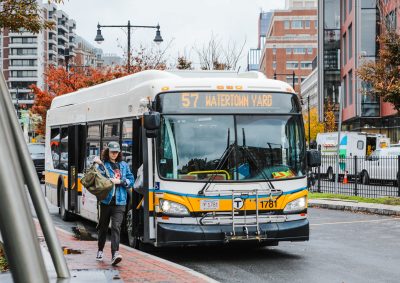
The Massachusetts Department of Transportation made fares free at 15 Regional Transportation Authorities across the state for 37 days starting Nov. 25, and the initiative excluded the MBTA.
“$2.5 million in funding was made available for the first time this year in the FY23 Budget,” MassDOT spokesperson Judith Reardon Riley wrote in an email. “The funding is specific to Regional Transit Authorities and does not include the MBTA.”
The distribution of the funding aims to prioritize areas with opportunities for increased ridership and low-income individuals, according to MassDOT.
While the MBTA buses and trains serve the greater Boston area, RTAs serve urban, suburban and some rural areas within Massachusetts. The two entities also differ in their budgets, with the Massachusetts Legislature distributing $94 million to RTAs for the 2023 fiscal year budget and MBTA being approved for a $2.55 billion budget.
Some cities have already gotten rid of fares for their RTA buses. The Worcester Regional Transit Authority eliminated fares at the beginning of the COVID-19 pandemic, and the city has kept the policy in place, further extending it until June 2023. The Merrimack Valley Regional Transit Authority voted on a two-year free fare pilot that began in March of this year.
“The additional MassDOT funding will allow (The Merrimack Valley Regional Transit Authority) to remain fare free for an additional six weeks, or until Patriots Day 2024, before having to make long term revenue determinations,” according to a MVRTA press release.
Mayor Michelle Wu announced a start date for a similar free transportation initiative in February of this year. Starting on March 1, fares on the 23, 28 and 29 MBTA buses became free which will be in effect until 2024. The plan used $8 million from the city’s federal coronavirus relief allocation.
In November, the MBTA released a redesigned bus network after revising a drafted plan through community feedback throughout the spring and summer.
“With the goal of modernizing the bus network through this redesign, this revised map also preserves direct rides to many locations throughout the service area,” MBTA General Manager Steve Poftak said in a press release. “(It) improves access to critical services like hospitals, and provides 25% more service than the existing network.”
Poftak announced he would be stepping down from his position in January and wrote in a letter to MBTA staff that during his time the MBTA has committed to “investing billions of dollars into modernizing the system with real results — modernizing the bus fleet.”
Helly Patel, a former Boston University student, said she takes the bus three times a day, and said she thinks eventually MBTA services should be free.
“Students probably (should get free fare) but then that creates a slippery slope for who should and should not get it for free,” Patel said. “The rate at which the MBTA, the quality of it is, I would think that they should focus more on making it better and than focus on making it free.”
The MBTA will be holding a virtual meeting on Dec. 8 to analyze and hear feedback about fare and service equity.




















































































































